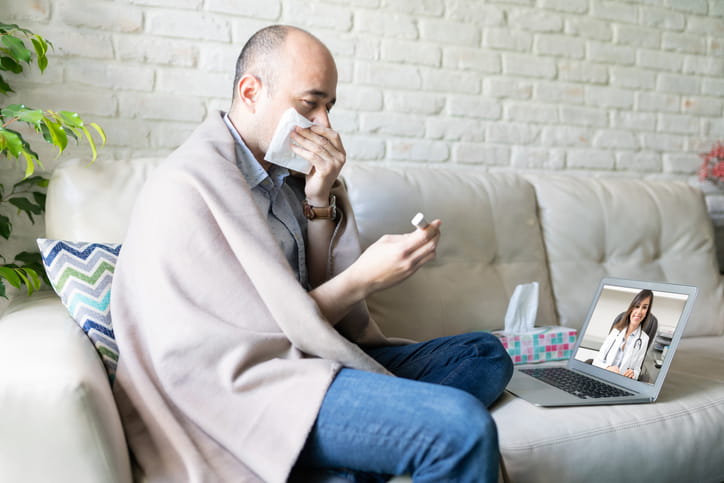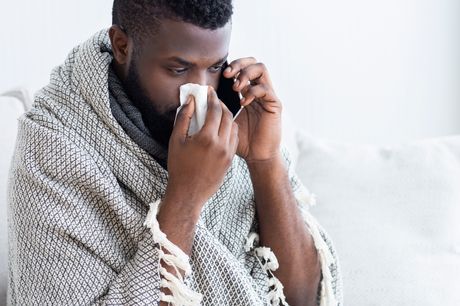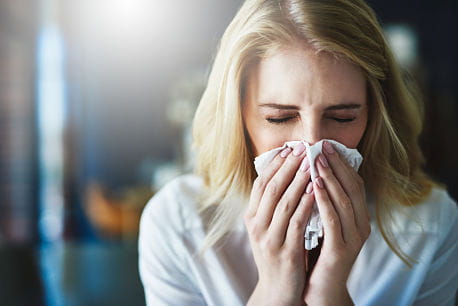Worried about coronavirus? Don’t run to the ER.
If you’re sick and worried about COVID-19, it’s important to know what to do, when to call your primary care physician and when to go to the ER. Here’s why.
If you’re feeling sick right now, you may be worried about having COVID-19. That’s understandable, but stay calm, avoid rash decisions and pay attention to your symptoms.
“Because symptoms of COVID-19 are similar to a cold or flu, it may be difficult to tell what you’re dealing with,” says Dr. Ronald Strony, co-chair of emergency medicine at Geisinger.
Symptoms of COVID-19 often include a fever, dry cough and shortness of breath — which you can also have with a cold or flu — but can range from a mild cough to severe pneumonia.
Common symptoms of the flu, cold and COVID-19 can include:
- Aches
- Chest discomfort
- Chills
- Cough
- Extreme tiredness (or fatigue)
- Headache
- Fever
- Nausea and diarrhea (more common in children)
- Runny nose
- Sneezing
- Sore throat
- Stuffy nose
If you’re sick and experiencing any of these symptoms, contact your doctor for advice on what to do next.
“But if you feel you have a medical emergency, like difficulty breathing or chest pain, come to the ER. It’s safe and we’re ready to help you at a moment’s notice during an emergency,” says Dr. Strony.
What should you do if you think you have COVID-19?
If you're having symptoms you think are related to COVID-19, contact your primary care physician first. Over the phone, they can assess your symptoms and recommend appropriate next steps.
Here's how to get in touch with your doctor:
- Contact your Geisinger doctor: Call your primary care clinic or message your care team by signing in to the MyGeisinger patient portal.
- Schedule through MyGeisinger: If you’re a Geisinger patient and think you might have COVID-19, you can screen yourself through MyGeisinger. If needed, you can schedule a COVID-19 test in MyGeisinger, too (or the MyChart mobile app).
- Don’t have a primary care physician or MyGeisinger? Call 570-284-3657 for guidance.

While you may start to feel anxious and want to get tested for COVID-19, it’s critical to call your doctor before heading to the closest ER or urgent care clinic (unless your symptoms worsen, and you have no other options for care).
When (and why) to visit or skip the ER or urgent care:
Mild symptoms? Skip the ER or urgent care
Most people who get COVID-19 have manageable symptoms and recover fully with common home remedies (if you do develop COVID-19, check out our tips for caring for yourself at home).
If you aren’t likely to have serious complications from COVID, your doctor may simply advise you to self-quarantine at home. During this time, make sure you stay at home (away from others) and monitor your symptoms. You should also:
- Avoid sharing personal items
- Wash your hands often
- Keep “high-touch” surfaces in your home clean
“If you need to seek medical care during this time, make sure you call ahead to let them know that you might have COVID-19,” says Dr. Strony. “This will help your healthcare team prepare, so they can prevent others from being exposed or infected.”
Severe and sudden symptoms or sudden injury? Visit the ER or urgent care
While you’re self-quarantined, keep an eye on your symptoms. If they worsen, call your doctor. They can help you figure out what to do next.
“If you develop any emergency warning signs for COVID-19, it’s important to seek care immediately by calling 911,” says Dr. Strony. These warning signs include:
- Difficulty breathing or shortness of breath
- Persistent pain or pressure in the chest
- Bluish lips or skin
- Sudden confusion or inability to arouse
And if you’ve been in an accident or are experiencing signs of a stroke or heart attack, don’t wait — go to the nearest ER as quickly as possible. “Our ER team is taking every precaution to get you the safe care you need during an emergency situation,” says Dr. Strony.
How to get a COVID-19 test
If you’re having symptoms, your doctor may suggest you have a COVID-19 test done to confirm whether you have the virus. Like many providers, Geisinger has developed its own test for COVID-19 to make testing more easily and quickly available in our communities.
In line with CDC recommendations, Geisinger is screening all people who meet CDC testing criteria. We’re also following traditional quarantine and isolation procedures while confirmatory tests are performed.
Here’s how you can get a COVID-19 test at Geisinger:
Use MyGeisinger to schedule a COVID-19 test
If you’re a Geisinger patient and think you might have COVID-19, you can screen yourself for symptoms and, based on your self-screening results, schedule a test via our patient portal MyGeisinger (or the MyChart mobile app).
How to screen yourself (and schedule a COVID test) in MyGeisinger:
- Log into MyGeisinger or the MyChart mobile app.
- Click “Appointments,” then “Schedule an appointment.”
- Choose “Schedule an appointment by selecting your reason for the visit.”
- Click “Coronavirus (COVID-19) testing.”
- Answer the screening questions, then walk through the steps to schedule your COVID test.
If you have a COVID-19 test and are waiting for your results, it’s best to self-isolate at home and take precautions to keep others safe.
Learn more about COVID-19 testing at Geisinger.
Visit our dedicated Cold & Flu Centers
As COVID-19 continues to spread, you need access to care and testing in the safest way possible, without visiting the ER.
We’ve temporarily dedicated some of our Convenient Care urgent care locations to treating cold and flu symptoms. You can turn to our temporary Cold & Flu Centers for:
- Fever
- Chills
- Sore throat
- New cough
- Runny nose
- Loss of taste or smell
- Nausea
- Diarrhea
Learn more about where our Cold & Flu Centers are and save your spot here.
You can prevent the spread of COVID-19
Why is it so important that those with mild coronavirus symptoms avoid ERs, urgent cares and doctor’s offices when possible? The simple answer is: To avoid infecting others. People over age 60, those with compromised immune systems and those with existing chronic health conditions — such as heart disease, cancer, diabetes and respiratory disease — are at risk of developing serious complications from COVID-19.
“We also want to protect our healthcare workers who need to be healthy to provide care for the those with serious illnesses,” adds Dr. Strony.
While COVID-19 is concerning, we can work together to slow and prevent its spread and keep our families, friends and neighbors healthy.
For the most up-to-date information on COVID-19, visit the CDC and Pennsylvania Department of Health websites.
And for more information about staying safe during COVID-19, as well as the latest information about vaccines, visit Geisinger’s Coronavirus Resource Center.
Next steps:
Visit our coronavirus resource center
Read our coronavirus FAQs
See our updated hospital visitation policy

Telemedicine video visits
See your doctor from the comfort of home — from routine care to specialty care
Get virtual care nowCOVID-19 updates: Visit Geisinger's Coronavirus Resource Center for the latest information and helpful resources.



